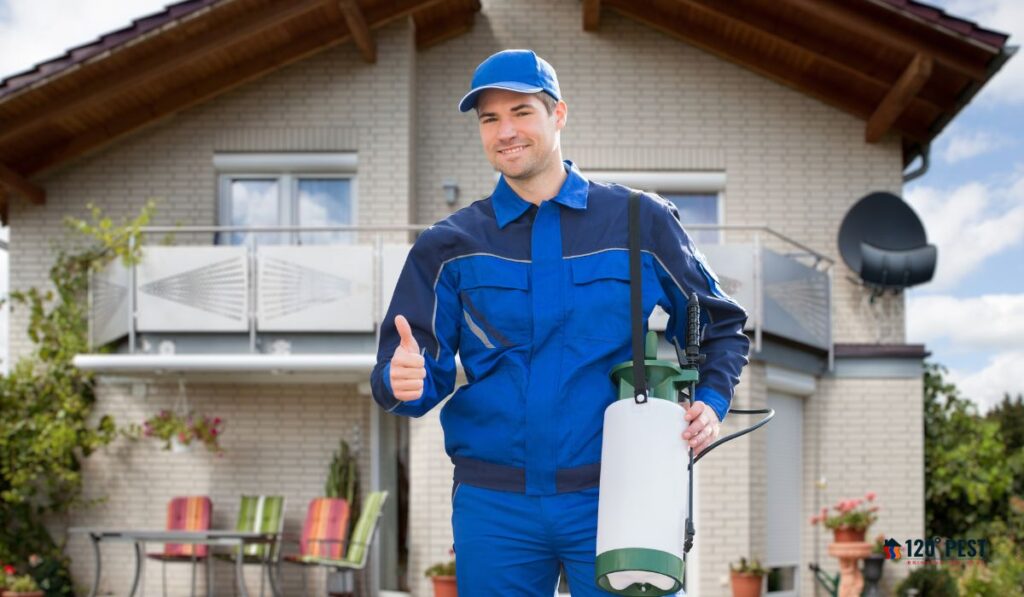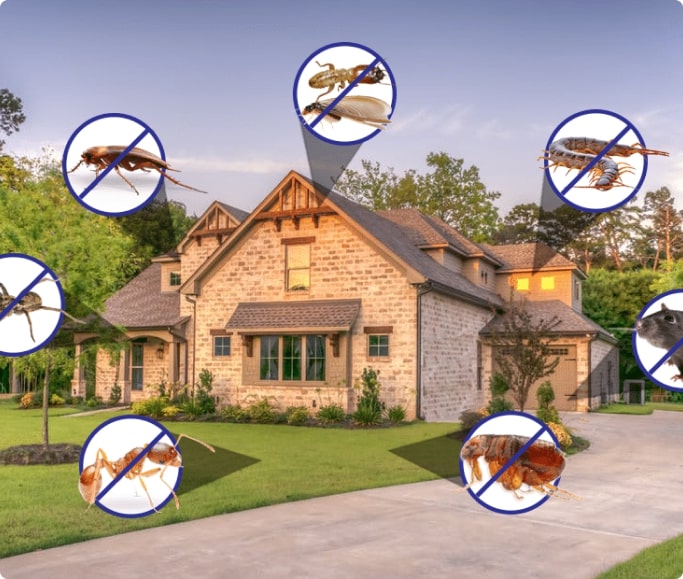Pest control is not merely about eradicating nuisance creatures from your living space; it’s a fundamental aspect of maintaining a healthy home environment. From safeguarding against diseases to preserving the structural integrity of your property, the significance of regular pest control cannot be overstated.
Pest control goes beyond addressing occasional insect sightings or rodent infestations; it encompasses a proactive approach to safeguarding your home and the well-being of its inhabitants. Understanding the connection between pest management and home health is essential for creating a safe and comfortable living environment.
Understanding Pest Control
At its core, pest control involves the management and elimination of various pests that can infiltrate homes and businesses. These pests range from common household insects like ants and cockroaches to more significant threats such as rodents, termites, and bed bugs. Recognizing the different types of pests and the risks they pose is crucial for effective pest management.
Health Implications of Pest Infestations
Pests aren’t just unsightly; they can also pose serious health risks to humans and pets alike. The presence of pests in the home can lead to the spread of diseases through contamination of food and surfaces. Additionally, allergens from pest droppings and sheddings can trigger respiratory issues and exacerbate existing conditions like asthma. Furthermore, living in a pest-infested environment can take a toll on mental health, causing stress, anxiety, and a sense of unease.
Structural Damage Caused by Pests

Beyond health concerns, pests can also wreak havoc on your home’s structural integrity. Rodents and insects can chew through wood, insulation, and wiring, leading to costly repairs and potential safety hazards. In severe cases, unchecked pest infestations can compromise the stability of foundations and structural components, posing significant risks to occupants.
Financial Costs of Pest Infestations
The financial ramifications of pest infestations extend far beyond the cost of extermination services. Property damage caused by pests can result in hefty repair bills and decreased property values. Moreover, homeowners may find themselves facing insurance complications, as policies may not cover damage caused by neglecting pest control measures.
Environmental Impact
Pest control efforts can also have environmental repercussions, mainly when harmful chemicals are used indiscriminately. Traditional pest control methods often involve the use of pesticides and insecticides, which can contaminate soil and water sources and harm non-targeted wildlife. Sustainable pest management practices aim to minimize environmental impact while effectively controlling pest populations.
Importance of Regular Pest Inspections
Routine pest inspections are crucial for detecting infestations early on and preventing widespread problems. By identifying and addressing pest issues in their early stages, homeowners can avoid costly damage and mitigate health risks. Investing in regular inspections is a proactive measure that can save both time and money in the long run.
Sustainable Pest Control Methods
Integrated Pest Management (IPM) offers a holistic approach to pest control that prioritizes prevention and minimizes reliance on chemical treatments. By combining multiple strategies, such as habitat modification, biological control, and targeted pesticide use, IPM aims to manage pest populations while effectively minimizing environmental impact. Embracing eco-friendly solutions and adopting preventive measures are essential steps towards sustainable pest control.
DIY vs. Professional Pest Control
While DIY pest control methods may offer temporary relief, they often fall short of addressing underlying issues and preventing future infestations. Professional pest control services provide expertise, specialized equipment, and access to more potent treatments that are not available to consumers. Knowing when to enlist the help of professionals is critical to effectively managing pest problems.
Pest Control as a Health Investment
Viewing pest control as a health investment rather than an expense is essential for prioritizing home safety. By proactively addressing pest issues, homeowners can protect themselves and their families from potential health hazards. Maintaining a pest-free environment not only promotes physical well-being but also contributes to peace of mind and overall quality of life.
Tips for Effective Pest Control
In addition to professional services, there are several measures homeowners can take to prevent and manage pest infestations. Regular cleaning and maintenance, sealing entry points, and proper food storage are simple yet effective strategies for keeping pests at bay. By incorporating these practices into their routine, homeowners can create an inhospitable environment for pests and minimize the risk of infestation.
Community Responsibility in Pest Control
Pest control is not solely the responsibility of individual homeowners; it is a collective effort that requires community involvement. Collaborative initiatives such as neighborhood clean-up efforts, sharing information about pest prevention, and advocating for sustainable pest management practices can have a significant impact on overall community health.
Future of Pest Control
Looking ahead, advancements in technology offer promising solutions for more efficient and sustainable pest control practices. From the development of innovative traps and deterrents to the use of drones for targeted pest management, the future of pest control is characterized by creativity and ingenuity. Embracing these advancements will be crucial in addressing evolving pest threats while minimizing environmental impact.
Pest control isn’t just about exterminating unwanted creatures; it’s about protecting the sanctuary you call home, ensuring it remains a place of safety and comfort for you and your loved ones.
Imagine the horror of waking up to find your kitchen overrun by cockroaches or the distress of discovering a family of rodents nesting in your attic. Beyond the initial shock and disgust, these situations can quickly escalate into full-blown health hazards, putting your family at risk of diseases and infections.
But the physical health implications are not the only concern. The constant stress and anxiety of living in a pest-infested environment can also affect mental well-being. Every rustle in the walls or scuttle across the floor becomes a source of fear and unease, robbing you of the peace and tranquility that should come with being at home.
And let’s remember the damage pests can inflict on your property. From chewing through electrical wiring to tunneling through support beams, these tiny intruders can cause thousands of dollars in structural damage, jeopardizing the very foundation of your home.
Conclusion
In conclusion, the importance of keeping up with pest control cannot be overstated. Beyond the nuisance of dealing with unwanted creatures, pest infestations pose significant risks to both physical and mental health, as well as the structural integrity of homes. By prioritizing regular inspections, adopting sustainable pest control methods, and seeking professional assistance when needed, homeowners can create a safe and healthy living environment for themselves and their families.
Contact 120 Pest Solutions today for expert assistance and tailored pest management solutions.
FAQs
Why is pest control important for my home?
Pest control is vital for your home’s health and your family’s well-being. It’s not just about getting rid of annoying pests; it’s about creating a safe and comfortable living environment free from the threats pests bring.
What does pest control involve?
Pest control includes managing and eliminating various pests that can invade homes and businesses. From common insects like ants to more severe threats like rodents and termites, understanding these pests and their risks is crucial for effective pest management.
How do pests affect my health?
Pests aren’t just unpleasant to look at; they can also spread diseases through contaminated food and surfaces. Allergens from their droppings and sheddings can worsen respiratory issues like asthma, and living in a pest-infested environment can cause stress and anxiety.
Can pests damage my home?
Yes, pests can wreak havoc on your home’s structure by chewing through wood, insulation, and wiring. This damage can lead to costly repairs and safety hazards and, in severe cases, compromise the stability of your home’s foundation.
Are there financial costs associated with pest infestations?
Definitely, propertyPest-caused property damage can result in hefty repair bills and decreased property values. Additionally, insurance may not cover damage caused by neglecting pest control measures, leading to further financial strain.
What about the environmental impact of pest control?
Traditional pest control methods often involve harmful chemicals that can contaminate soil and water sources, harming wildlife. Sustainable pest management practices aim to minimize this impact while effectively controlling pests.
How necessary are regular pest inspections?
Routine inspections are crucial for detecting infestations early and preventing widespread problems. By addressing pest issues early on, homeowners can save both time and money in the long run.
What are sustainable pest control methods?
Integrated Pest Management (IPM) combines various strategies to manage pests while minimizing environmental impact. Embracing eco-friendly solutions and preventive measures is an essential step towards sustainable pest control.
Should I use professional pest control services or DIY methods?
While DIY methods may offer temporary relief, professional services provide expertise and access to potent treatments. Knowing when to seek professional help is critical to effectively managing pest problems.
Why should I view pest control as a health investment?
Prioritizing pest control protects your family from potential health hazards and contributes to peace of mind and overall quality of life.
What are some tips for effective pest control?
Regular cleaning, maintenance, and proper food storage are simple yet effective strategies for keeping pests at bay.
Is pest control solely my responsibility as a homeowner?
Pest control is a collective effort that requires community involvement. Collaborative initiatives can significantly impact overall community health.
What does the future of pest control look like?
Advancements in technology offer promising solutions for more efficient and sustainable pest control practices, ensuring a safer and healthier future for homes and communities.




